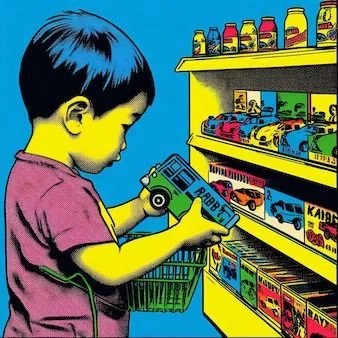Issue 2: Mindful Consumption
Summer 2024
Remember being first introduced to the concept of money as a child? It was simply that objects and experiences require money. Maybe you wanted things only because others wanted them? In 1928, Robert Quillen defined Americanism as “using money you haven’t earned to buy things you don’t need to impress people you don’t like.” Nearly a century later, 1 in 4 Americans have less than $1000 in savings. [Forbes 2024] This includes all types of personal savings, such as emergency funds, non-workplace retirement accounts and investments.
CONSUMERISM
Like other habits, desires beyond our core needs of shelter, food and safety began in the school yard. My shoes fit just fine, but have you seen the latest retro Jordan collabs on TikTok? Our consumerism has been shaped by magazines, television, and now social media with its charade of influencers.
The lovable 12-year old Ryan Kaji has a net worth of $100M as star of his YouTube channel. During these episodes, Ryan opens one toy after another for his 34M subscribers...including families with less than $1000 in the bank. If everything goes as planned, some of the family’s savings will go to that toy endorsed by Ryan.
SO WHAT?
Even those who have difficulty saving money can list its benefits from asset accumulation to simple peace of mind. They know that saving towards a more significant goal or experience requires incremental sacrifice. Every financial literacy post (including this one) will tell you that foregoing needless trinkets and daily splurges can eventually finance a major purchase…the type that retains value or creates lifelong memories.
Savings = financial security = investing = surest pathway to financial independence. If saving is the foundation of our money tree, how do we plant this seed in today’s world?
MINDFUL CONSUMPTION
“Advertising has these people chasing cars and clothes they don’t need. Generations have been working in jobs they hate, just so they can buy what they don’t really need.” - Fight Club
We know It’s a monumental task to be a contrarian, especially when advertisers have been training us to consume since our first commercial break. For us contrarians at My Uncle Satoshi, mindful consumption is our favorite mechanism to save money. There are broader benefits of this mindset from reduced clutter to a life with clarity and purpose. The researchers know that shopping gives us the same feeling as getting high, a well-studied dopamine hit enhanced by peer approval. Yet if we don’t live to impress others, saving money naturally follows. When we scrutinize purchases on their return to our financial goals, personal health and ethical stance…the buy list simply gets shorter.
NO LIKES NEEDED
There’s no big “congratulations” when you reach a financial literacy milestone. Social media is full of celebrations for landing that home, blowing $50K+ on a fairytale wedding, or sliding into the new car lease…these become the very shackles that weigh us down.
When you become more financially literate, the only one celebrating is you, those you really care about, and maybe a few friends from the FIRE subreddit. Start on that road to saving money early. When it comes to children and money, it’s not just learning to buy things. Teach mindful consumption. Should it be purchased at all? Don’t forget to ask yourself the same.
SUMMARY
We have all been conditioned to consume. There is nothing sinister about it. There is no conspiracy. It’s simply the evolution of business and advances in neuromarketing that got us here.
Financial freedom begins with saving money, but something so simple can be quite difficult for many.
Mindful consumption is both a lifestyle and opportunity to save money.
Pursue financial independence without fanfare.





